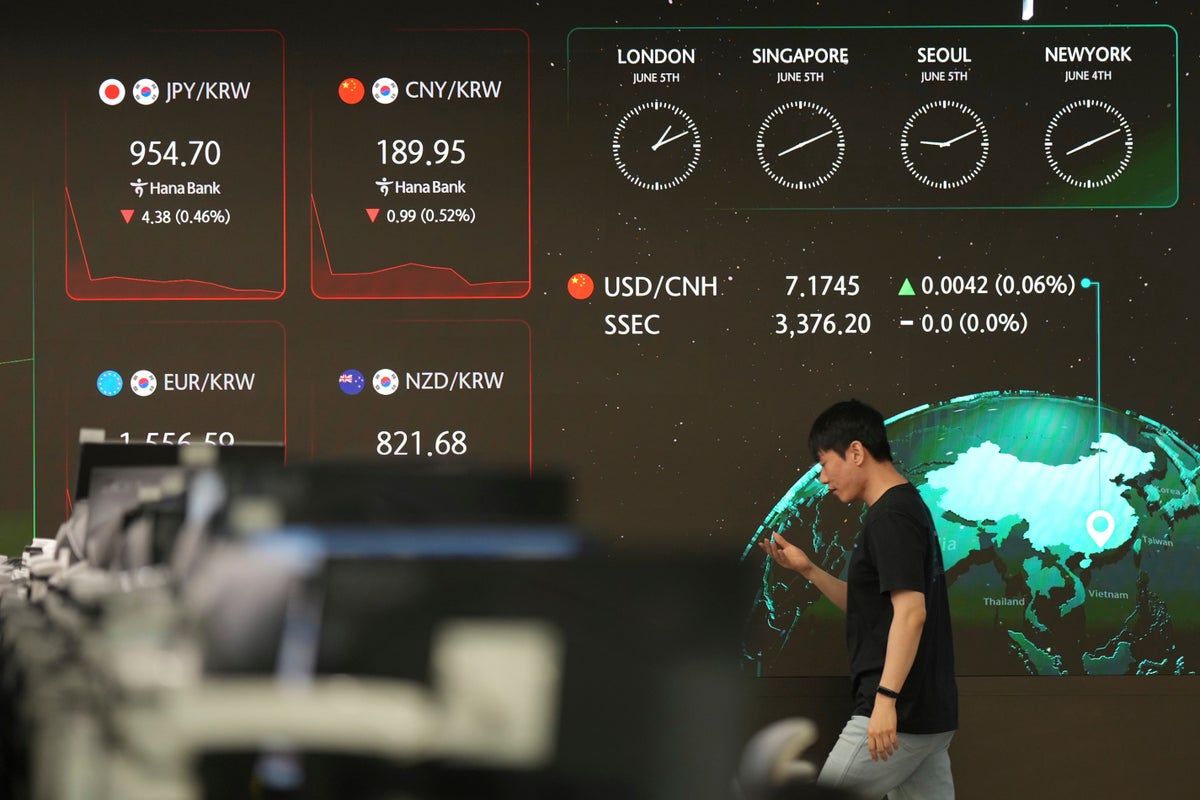
Asian shares were mixed on Thursday, as Wall Street’s big recent rally lost some momentum following a pair of potentially discouraging reports on the American economy.
U.S. futures edged lower and oil prices declined.
Japan's benchmark Nikkei 225 shed 0.2% to 37,658.46, while Australia's S&P/ASX 200 declined nearly 0.1% to 8,535.10.
In South Korea, the Kospi jumped 2.1% to 2,829.48 after the country's new president and leading liberal politician Lee Jae-myung began his term, vowing to restart talks with North Korea and beef up a trilateral partnership with the U.S. and Japan.
Hong Kong's Hang Seng gained 0.9% to 23,856.54, while the Shanghai Composite was little changed, inching down less than 0.1% to 3,374.30.
On Wednesday, the S&P 500 finished the day virtually unchanged at 5,970.81 and remained 2.8% below its all-time high. The Dow Jones Industrial Average fell 0.2% to 42,427.74, and the Nasdaq composite added 0.3% to 19,460.49.
The action was stronger in the bond market, where Treasury yields tumbled following the weaker-than-expected economic updates.
One said that activity contracted for U.S. retailers, finance companies and other businesses in the services industries last month, when economists were expecting to see growth. Businesses told the Institute for Supply Management in its survey that all the uncertainty created by tariffs is making it difficult for them to forecast and plan.
A second report from ADP suggested U.S. employers outside of the government hired far fewer workers last month than economists expected. That could bode ill for Friday’s more comprehensive jobs report coming from the U.S. Labor Department, which is one of Wall Street’s most anticipated data releases each month.
So far, the U.S. job market has remained remarkably resilient despite years of high inflation and now the threat of President Donald Trump’s high tariffs. But weakness there could undermine the rest of the economy.
Following the reports, traders built up bets that the Federal Reserve will need to cut interest rates later this year in order to prop up the economy, which in turn caused the fall for Treasury yields. The weaker-than-expected ADP report also led Trump to urge Fed Chair Jerome Powell to deliver cuts to rates more quickly.
“‘Too Late’ Powell must now LOWER THE RATE,” Trump said on his Truth Social platform. “He is unbelievable!!!”
The Fed has yet to cut interest rates this year after slashing them through the end of 2024. Part of the reason for the pause is that the Fed wants to see how much Trump’s tariffs will hurt the economy and raise inflation. While lower interest rates could boost the economy, they could also give inflation more fuel.
Longer-term Treasury yields have also been rising in recent weeks because of reasons outside the Fed’s control. Investors have been demanding the U.S. government pay more in interest to borrow because of worries about whether it’s set to add trillions of dollars to its debt through tax cuts under discussion on Capitol Hill.
Investors are hoping for deals that will lower Trump's tariffs. But nothing is assured. The European Union’s top trade negotiator, Maroš Šefčovič, met Wednesday with his American counterpart, U.S. Trade Representative Jamieson Greer, on the sidelines of a meeting of the Organisation for Economic Cooperation and Development.
In the bond market, the yield on the 10-year Treasury fell to 4.35% from 4.46% late Tuesday. The two-year Treasury yield, which more closely tracks traders’ expectations for what the Fed will do with overnight interest rates, eased to 3.86% from 3.96%.
In other dealings early Thursday, benchmark U.S. crude fell 8 cents to $62.77 a barrel. Brent crude, the international standard, edged up 1 cent to $64.87 a barrel.
The U.S. dollar rose to 142.87 Japanese yen from 142.78 yen. The euro cost $1.1413, little changed from $1.1418.
___
AP Business Writer Stan Choe contributed.







